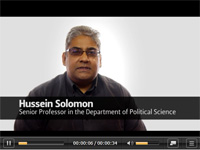Latest News Archive
Please select Category, Year, and then Month to display items
04 April 2024
|
Story Lunga Luthuli
|
Photo SUPPLIED
 Dr Juliet Kamwendo champions gender-inclusive climate action in Africa. Her expertise at the recently held AFR100 workshop highlighted vital steps towards sustainable and equitable development.
Dr Juliet Kamwendo champions gender-inclusive climate action in Africa. Her expertise at the recently held AFR100 workshop highlighted vital steps towards sustainable and equitable development.
Dr Juliet Kamwendo, Lecturer and Programme Director for Gender Studies in the Centre for Gender and Africa Studies at the University of the Free State, is spearheading efforts to integrate gender considerations into Africa's climate restoration agenda. Reflecting on her involvement, Dr Kamwendo stated, "This is particularly crucial, as women make up almost 50% of the population in Africa, and the depletion and degradation of land affect them disproportionately."
She recently served as a gender expert at the AUDA-NEPAD AFR100 workshop in Ouagadougou, Burkina Faso, from 25 to 29 March 2024. This initiative aims to restore forests and degraded land across Africa by 2030, with a focus on gender equality.
The workshop emphasised the integration of gender perspectives into the AFR100 project, acknowledging the disproportionate impact of land degradation on women. Dr Kamwendo's expertise highlighted the need to empower women in climate change interventions, addressing existing gender inequalities exacerbated by environmental degradation.
“Women – who are primarily responsible for household food security and water provision – bear the brunt of environmental degradation, leading to increased workloads, reduced income opportunities, and heightened vulnerability to climate-related disasters. Furthermore, the loss of forest cover and biodiversity further exacerbates the challenges faced by women, particularly in rural areas where they depend heavily on natural resources for their livelihoods,” added Dr Kamwendo.
Her participation highlights academia's crucial role in fostering inclusive and sustainable development, emphasising interdisciplinary collaboration to tackle complex environmental challenges. Through initiatives such as AFR100, stakeholders are working towards a more resilient and gender-responsive future for Africa.
Islam. Boko Haram. Terrorism. Prof Hussein Solomon offers insight.
2014-09-04
 Photo: en.wikipedia.org |
Prof Hussein Solomon introduction: video

When it comes to politics, there are lots of negative talk, but without any action or solutions.
However, with Prof Hussein Solomon, Senior Professor at the UFS’s Department of Political Science, there is not a lot of talk without solutions, but great activity regarding research work published on Islam, the Middle East, Boko Haram and environmental issues in Africa.
Prof Solomon’s most recently published article, Five Lessons Learned from Ejecting Islamists in Mali, was published in the Research on Islam and Muslims in Africa (RIMA) Policy Papers on 1 September 2014.
(https://muslimsinafrica.wordpress.com/2014/09/01/five-lessons-learned-from-ejecting-islamists-in-mali-professor-hussein-solomon/ ).
“The terrorist threat is mounting with each passing day in Africa with Islamist terror groups exploiting the ungoverned spaces, the availability of weapons, porous borders, an incompetent security apparatus and corruption in the political establishment,” Prof Solomon writes in this paper.
“It is therefore important, to explore cases where attempts have been made to dislodge the Islamists with a view to learn lessons so that future interventions do not repeat the failures of the past. This paper explores the intervention and lessons which could be learned from French and Economic Community of West African States (ECOWAS) attempts to oust Islamists in northern Mali in 2013.”
Prof Solomon holds a DLitt et Phil (Political Science) from the University of South Africa (UNISA). In 2011, he was Visiting Professor at the Osaka School for International Public Policy (OSIPP). In 2007 and 2010 he was Visiting Professor at the Global Collaboration Centre at Osaka University in Japan and in 2008 he was Nelson Mandela Chair of African Studies at Jawahrlal Nehru University in New Delhi, India. In 1994, he was Senior Visiting Fellow at the Department of War Studies, King’s College at the University of London. He is currently a Visiting Fellow at the MacKinder Programme for the Study of Long-Wave Events at the London School of Economics and Political Science in the United Kingdom.
He is also a Senior Associate for the Israeli-based think tank Research on Islam and Muslim in Africa and a Senior Analyst for WikiStrat.
More articles by Prof Solomon:
Boko Haram and the case of the abducted school girls
http://muslimsinafrica.wordpress.com/2014/05/14/reinvigorating-the-fight-against-boko-haram-professor-hussein-solomon/
Australian Broadcasting Corporation interview on Boko Haram
http://www.abc.net.au/radionational/programs/counterpoint/boko-haram/5657882
Reflections on Inga 3 and Beyond
www.saccps.blogspot.com
Nile and Okavanga River Basins (pdf)
Nigeria’s Boko Haram: Beyond the rhetoric (pdf)